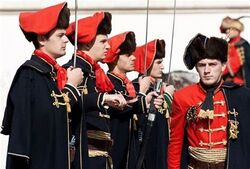Great Prince's Own Royal Thračician Foot Guard: Difference between revisions
Tag: 2017 source edit |
m →Origin Tag: 2017 source edit |
||
| Line 44: | Line 44: | ||
==History== | ==History== | ||
===Origin=== | ===Origin=== | ||
The Guard originates from [[1623]] when Terentius, Archduke of the [[Sydona]]s pledged an honor regiment to [[List_of_Rulers_of_Burgundie#Marlianus_Dynasty|Fransois I]], [[Duchy of Bourgondi|Duke of Bourgondi]] as a dowery for his daughter's hand in marriage. This regiment was named ' | [[File:Slag om Grolle 2008-2 - Musketiers in Spaanse dienst.jpg|right|200px]] | ||
The Guard originates from [[1623]] when Terentius, Archduke of the [[Sydona]]s pledged an honor regiment of 1,000 men to [[List_of_Rulers_of_Burgundie#Marlianus_Dynasty|Fransois I]], [[Duchy of Bourgondi|Duke of Bourgondi]], as a dowery for his daughter's hand in marriage. This regiment was named "The Sydonian Band of Royal Footmen" ([[Burgoignesc language|Burg]]: ''la Bande Sydonaise Peleton Real''). For the first 60 years, these men were originally uniformed, trained, and used as standard {{wp|Pike and shot}} infantry. In [[1684]] a new commander came from [[Sydona]], Ljubomir Ivanišević, who wanted to make the unit more Thračician in its uniform and traditions. Under his command the unit adopted the uniform and tactics of the Thračicians of Sydona once again and they began to distinquish themselves. In a brilliant publicity move, he recommended to [[List_of_Rulers_of_Burgundie#Bourgondii_Marius_Dynasty|Duke Louis I]] that ''la Bande Sydonaise Peleton Real'' travel around the [[Holy Levantine Empire]] to showcase not only their skill about also their foreignness, as a demonstration of the [[Duchy of Bourgondi]]'s global reach. This was a sensation at court and the [[Levantia|Levantine]] use of [[Thračician]] mercenaries increased, though none proved to be as professional and effective as ''la Bande Sydonaise Peleton Real''. | |||
===Heyday=== | ===Heyday=== | ||
In time, the regiment grew due to the increased use of [[Thračicians]] in [[Duchy of Bourgondi|Bourgondi's]] [[Burgoignesc colonial empire|colonial ambitions]] and the regiment became a symbol of the good [[Sydona]]n-[[Burgundie|Burgoignesc]] relations. It took an active role in most [[Burgundie|Burgoignesc]] [[Military history of Burgundie|conflicts]], both internal and external. Even after [[Sydona]] became a possession of [[Kiravia]], [[Kiro-Burgoignesc Wars|a sworn enemy]] of [[Burgundie]], the regiment remained though ties with [[Burgundie]] had been severed. | In time, the regiment grew due to the increased use of [[Thračicians]] in [[Duchy of Bourgondi|Bourgondi's]] [[Burgoignesc colonial empire|colonial ambitions]] and the regiment became a symbol of the good [[Sydona]]n-[[Burgundie|Burgoignesc]] relations. It took an active role in most [[Burgundie|Burgoignesc]] [[Military history of Burgundie|conflicts]], both internal and external. Even after [[Sydona]] became a possession of [[Kiravia]], [[Kiro-Burgoignesc Wars|a sworn enemy]] of [[Burgundie]], the regiment remained though ties with [[Burgundie]] had been severed. | ||
Revision as of 23:09, 21 January 2024
| This article is a stub. You can help IxWiki by expanding it. |
| Great Prince's Own Royal Thračician Foot Guard | |
|---|---|
| Peletons d'Elite Tharchicien della Gran Prince | |
 Thračicians on Parade under the review of Teniente Propietare Đureković | |
| Founded | 1623 |
| Country | |
| Type | Royal guard, light infantry |
| Size | 1,254 |
| Part of | Army of Burgundie |
| Colors | red and black
sang et suie blood and soot |
| Commanders | |
| Propietare (COL) (Honorary) | Pasqual I |
| Teniente Propietare (LT COL) (Operational commander) | Dalibor Đureković |
| Insignia | |
| Guidon of the Great Prince's Own Royal Thračician Foot Guard | Guidon Great Prince's Own Royal Thrachician Foot Guard.png |
The Great Prince's Own Royal Thračician Foot Guard is an ethnic Thračician Guard demi-regiment in the direct service of the Great Prince of Burgundie. The Guard is a non-mechanized infantry demi-regiment tasked with the protection of the Great Prince, his family and possessions. It is one of the only permanent and active military unit in the Burgoignesc Metropole.
History
Origin

The Guard originates from 1623 when Terentius, Archduke of the Sydonas pledged an honor regiment of 1,000 men to Fransois I, Duke of Bourgondi, as a dowery for his daughter's hand in marriage. This regiment was named "The Sydonian Band of Royal Footmen" (Burg: la Bande Sydonaise Peleton Real). For the first 60 years, these men were originally uniformed, trained, and used as standard Pike and shot infantry. In 1684 a new commander came from Sydona, Ljubomir Ivanišević, who wanted to make the unit more Thračician in its uniform and traditions. Under his command the unit adopted the uniform and tactics of the Thračicians of Sydona once again and they began to distinquish themselves. In a brilliant publicity move, he recommended to Duke Louis I that la Bande Sydonaise Peleton Real travel around the Holy Levantine Empire to showcase not only their skill about also their foreignness, as a demonstration of the Duchy of Bourgondi's global reach. This was a sensation at court and the Levantine use of Thračician mercenaries increased, though none proved to be as professional and effective as la Bande Sydonaise Peleton Real.
Heyday
In time, the regiment grew due to the increased use of Thračicians in Bourgondi's colonial ambitions and the regiment became a symbol of the good Sydonan-Burgoignesc relations. It took an active role in most Burgoignesc conflicts, both internal and external. Even after Sydona became a possession of Kiravia, a sworn enemy of Burgundie, the regiment remained though ties with Burgundie had been severed.
The Modern Guard

Due to decreased demand for full time soldiers in the Burgoignesc military, the number of soldiers being replaced in the Foot Guard has dwindled. At is peak in the 1840s the Foot Guard was 6,500 strong, but its current roster is merely 1,254. Since the Second Great War, in 1937, the unit was reorganized to also include Chrobonskians who serve in the unit until today. To honor the original agreement with the Thračicians the unit will retain its regimental designation, but currently operates at demi-regiment status.